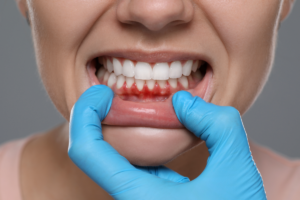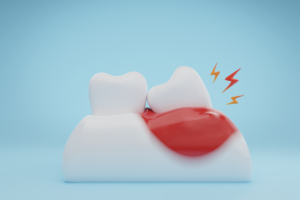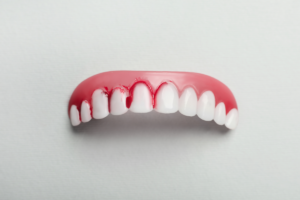Gingivitis is a common but often overlooked oral health condition characterized by inflammation of the gums. It is the earliest stage of gum disease and, if untreated, can progress to more severe issues such as periodontitis, which may result in tooth loss. The primary signs of gingivitis include redness, swelling, and bleeding gums, particularly during brushing or flossing. However, many individuals fail to address these symptoms due to their subtlety or because they don’t cause immediate discomfort.
Neglecting gingivitis can have far-reaching consequences, not only for your dental health but also for your overall well-being. Research shows that gum disease is linked to systemic conditions like heart disease, diabetes, and respiratory infections. This underscores the importance of recognizing gingivitis as more than just a dental issue—it’s a significant health concern that warrants attention.
Understanding and addressing gingivitis is crucial for maintaining not just a confident smile but also a healthy body. The condition, often caused by plaque buildup due to poor oral hygiene, creates an environment where bacteria thrive, triggering gum inflammation. While easily preventable and treatable in its early stages, ignoring gingivitis can lead to complications that impact both oral and systemic health.
Beyond its physical implications, gingivitis can also affect an individual’s quality of life, leading to bad breath, discomfort while eating, and self-consciousness about their appearance. Recognizing the condition early and taking proactive measures can prevent it from escalating, ensuring a healthier and more comfortable daily life. By shedding light on the importance of gum health, this article aims to empower readers with knowledge and practical steps to keep their smiles healthy and vibrant.
The Importance of Identifying the Factors That Cause Gingivitis
Understanding the root causes of gingivitis is the first step in prevention and effective management. Many people are unaware that daily habits, lifestyle choices, and underlying health conditions can contribute to gum problems. Identifying these factors empowers individuals to make informed changes to their routines, ensuring better oral hygiene and reducing the risk of complications.
By addressing the common causes of gingivitis, such as poor dental hygiene or dietary habits, you can take proactive measures to maintain healthy gums. This article explores the top 10 factors that contribute to gingivitis and provides actionable tips to avoid them, equipping you with the knowledge needed to protect your smile and overall health.
Gingivitis is more than just a minor gum issue—it’s a warning sign of deeper oral health concerns. Recognizing the factors that contribute to its development is key to taking control of your dental health and preventing more severe conditions like periodontitis. Often, the triggers of gingivitis are subtle, hiding in plain sight within our everyday routines, from the foods we eat to how we care for our teeth.
By identifying these contributing elements, you can not only prevent gum inflammation but also improve your overall well-being. Healthy gums are fundamental to a strong foundation for your teeth and a confident smile. In this article, we’ll dive into the most common causes of gingivitis, helping you uncover the small changes that can make a big difference in your oral health journey.
Poor Oral Hygiene: The Primary Culprit
Failing to maintain proper oral hygiene is the leading cause of gingivitis. Neglecting to brush and floss regularly allows plaque—a sticky film of bacteria—to accumulate on your teeth and along the gumline. Over time, this plaque hardens into tartar, which irritates the gums and leads to inflammation. Without intervention, this can escalate to more severe gum diseases. To prevent gingivitis, it’s crucial to brush twice a day with fluoride toothpaste and floss daily to remove debris and bacteria from hard-to-reach areas.
A Diet High in Sugars and Carbohydrates
Sugary and starchy foods fuel the bacteria in your mouth, creating acids that attack your teeth and gums. Frequent consumption of such foods contributes to plaque buildup and exacerbates the risk of gingivitis. Incorporating a balanced diet rich in vegetables, fruits, and whole grains can help protect your gums. Additionally, drinking plenty of water after meals and snacks aids in washing away food particles and neutralizing harmful acids.
Inconsistent Flossing Habits
Flossing is an essential component of oral care that many people overlook. Without it, food particles and plaque can remain between teeth, areas that brushing alone cannot reach. Over time, this leads to gum irritation and inflammation. Regular flossing not only prevents gingivitis but also reduces the risk of cavities. If traditional floss feels cumbersome, alternatives like floss picks or water flossers can make the task easier and more effective.
Smoking and Tobacco Use
Smoking and the use of tobacco products are major risk factors for gingivitis and other oral health issues. Tobacco weakens the immune system, making it harder for the body to fight off infections, including gum disease. Additionally, it reduces saliva production, leading to a dry mouth where bacteria thrive. Quitting smoking significantly improves gum health and reduces the risk of developing severe gum diseases and oral cancers.
Systemic Diseases and Medical Conditions
Certain systemic conditions, such as diabetes, hormonal changes (e.g., pregnancy or menopause), and autoimmune disorders, can increase the risk of gingivitis. For example, diabetes affects blood sugar levels and weakens the body’s ability to combat bacterial infections, including those in the gums. People with such conditions should prioritize meticulous oral care and consult their healthcare provider for personalized advice.
Stress and Lack of Sleep
Stress and sleep deprivation can weaken your immune system, making it less effective at warding off infections like gingivitis. High stress levels may also lead to poor oral hygiene habits or teeth grinding, which can damage the gums. Managing stress through relaxation techniques and ensuring adequate sleep can improve both overall health and gum resilience.
Excessive Alcohol Consumption
Alcohol dries out the mouth, reducing saliva production. Saliva plays a vital role in neutralizing acids, washing away bacteria, and maintaining gum health. Excessive drinking can also lead to poor dietary choices and neglect of oral hygiene. To minimize the risks, drink alcohol in moderation, stay hydrated, and maintain a consistent oral care routine.
Incorrect Brushing Techniques
Brushing too hard or using a toothbrush with hard bristles can damage the gums, causing recession and making them more susceptible to gingivitis. Conversely, brushing too lightly or skipping areas leaves plaque behind. Use a soft-bristled toothbrush and gentle circular motions to clean teeth effectively without harming the gums.
Lack of Regular Dental Check-Ups
Skipping routine dental visits prevents the early detection and treatment of gingivitis. Professional cleanings remove tartar buildup that brushing and flossing cannot address. Dentists also monitor your oral health, providing personalized guidance to prevent gum disease. Scheduling check-ups every six months is a simple yet vital step toward maintaining healthy gums.
Inadequate Care with Orthodontic Appliances
Braces and other orthodontic devices create additional surfaces for plaque to accumulate, increasing the risk of gingivitis. Without proper cleaning techniques, food particles and bacteria can become trapped around brackets and wires. Using special orthodontic brushes, floss threaders, and mouth rinses ensures that you maintain gum health while undergoing orthodontic treatment.
Each of these factors plays a significant role in contributing to gingivitis, but the good news is that they can be effectively managed or avoided with consistent care and informed choices. Taking proactive steps in these areas will not only improve your gum health but also enhance your overall well-being.
Simple Changes Can Prevent Gingivitis
Preventing gingivitis doesn’t require drastic measures—small, consistent changes in your daily routine can make a significant difference. Prioritizing proper oral hygiene by brushing twice daily, flossing regularly, and using an antibacterial mouthwash is the foundation of gum health. Paying attention to diet, avoiding excessive sugars, and drinking plenty of water also help reduce plaque buildup and support healthier gums. If you smoke or use tobacco, quitting can drastically improve your oral health and overall well-being.
Understanding the factors that contribute to gingivitis allows you to take proactive steps to avoid them. For example, learning proper brushing techniques, managing stress, and scheduling regular dental visits can prevent gum inflammation and stop early signs of gingivitis from progressing into more severe conditions like periodontitis.
The Benefits of a Complete Oral Care Routine
Maintaining a thorough oral care routine offers benefits that extend beyond a healthy smile. Healthy gums reduce the risk of tooth loss, enhance your ability to eat and speak comfortably, and contribute to fresh breath and a more confident appearance. Additionally, good gum health supports overall wellness, as research shows a connection between oral health and systemic conditions like heart disease and diabetes.
By taking simple yet effective actions to care for your gums, you’re not only preserving your dental health but also protecting your long-term health. A proactive approach to gingivitis prevention is an investment in your overall quality of life, ensuring that your smile remains healthy, beautiful, and pain-free for years to come.
Incorporating a complete oral care routine into your daily life is one of the most impactful ways to maintain both oral and overall health. The benefits of healthy gums extend far beyond aesthetics, helping you preserve your natural teeth, prevent discomfort, and even reduce the risk of more serious health conditions. By dedicating time to regular brushing, flossing, and professional dental check-ups, you’re taking essential steps to protect not only your gums but also your heart, digestive system, and immune function.
Moreover, investing in your oral health now can save you from more extensive and costly dental treatments in the future. Small habits, like maintaining a balanced diet and quitting smoking, can significantly reduce the risk of developing gum disease and its complications. Ultimately, a complete oral care routine enhances your confidence and quality of life, allowing you to enjoy a healthy, radiant smile for years to come. By prioritizing your gums today, you’re setting the foundation for long-term wellness tomorrow.




